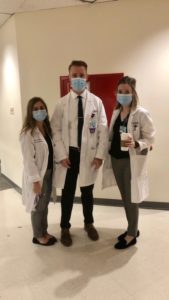Foundation for Learning
Our program provides residents with meaningful exposure to clinical practice in the field of Obstetrics and Gynecology (OB/GYN), while providing a comprehensive didactic program that serves as a foundation for continuous learning in the field.
Our Mission
As the primary academic health center in the state of Arkansas, the mission of UAMS is to improve the health, health care and well-being of Arkansans and others in the region, nation and the world. Aligned with the overall UAMS mission, the mission of our Obstetrics and Gynecology Residency Program is to educate and prepare exemplary residents to become competent, compassionate general obstetricians and gynecologists capable of providing high-quality, innovative, patient-and family-centered health care for any of the wide spectrum of patients they may encounter. Our program graduates residents who have the confidence and expertise to enter any level of professional life whether it be academic or private practice. Residents are trained to provide culturally sensitive care with appreciation of the social determinants of health and the impact they have when providing care to the underserved and special populations of the region. Our program encourages residents to contribute to the advancement of knowledge in our field by conducting research and to seek ways to continuously improve and deliver the safest care to our patients.
Our Goals
We prepare residents not only for assuming independent practice responsibilities when they finish, but also prepare them to enter any fellowship program on par with residents from other top academic centers. Our residents have pursued rewarding careers in private practice, teaching, research, and fellowships in virtually all subspecialties recognized by the American Board of Obstetrics and Gynecology (ABOG).
The residency program is designed in accordance with the educational objectives for residents in OB/GYN, as outlined by the Council of Resident Education in Obstetrics and Gynecology (CREOG). In addition, the curriculum is designed to ensure competency in all six of the core competencies required by the Accreditation Council on Graduate Medical Education (ACGME).
Primary Goals
- Provide a base of factual knowledge in the pre-clinical and clinical aspects of OB/GYN.
- Provide supervised exposure to a wide array of patients and clinical conditions, enabling residents to assume progressive responsibility over the four years of training.
- Provide each resident with a foundation for continued, lifelong learning.
- Enable each graduate to function as an Ob/Gyn specialist and a primary care physician beyond the reproductive system.
- Guide residents in the development of strong interpersonal and communication skills and to exhibit professionalism at all times with patients and colleagues.
- Ensure that each resident is familiar with all aspects of the health care system, including evidence-based medicine, systems-based practice, and practice-based learning.
Certification in Obstetrics and Gynecology

OB/GYN Residents
After residency, a physician may seek certification from the American Board of Obstetrics and Gynecology (ABOG). To become a board-certified physician, residents must pass a written test to demonstrate that he or she has obtained the special knowledge and skills required for medical and surgical care of women. He or she must also show experience in treating women’s health care prior to the oral examination. An oral examination is given by a team of well-respected national experts; the exam tests the physician’s skills, knowledge and ability to treat different conditions.
Training and Certification in Subspecialties
OB/GYNs may become further specialized in the areas of:
- Maternal-Fetal Medicine – care of high-risk pregnancy
- Gynecologic Oncology – care of women with cancers of the reproductive system
- Reproductive Endocrinology & Infertility – care of women who have hormonal or infertility problems
- Female Pelvic Medicine & Reconstructive Surgery – care of urinary tract dysfunction and disorders stemming from loss of support of pelvic structures
- Pediatric and Adolescent Gynecology
- Minimally Invasive Gynecologic Surgery
This additional training and certification requires two to three years of education after a basic residency, and the passing of both a written and oral examination. All certified OB/GYNs can treat patients with these disorders; however, some physicians have this extra training that qualifies them to take a written and oral test to be certified in these areas.
